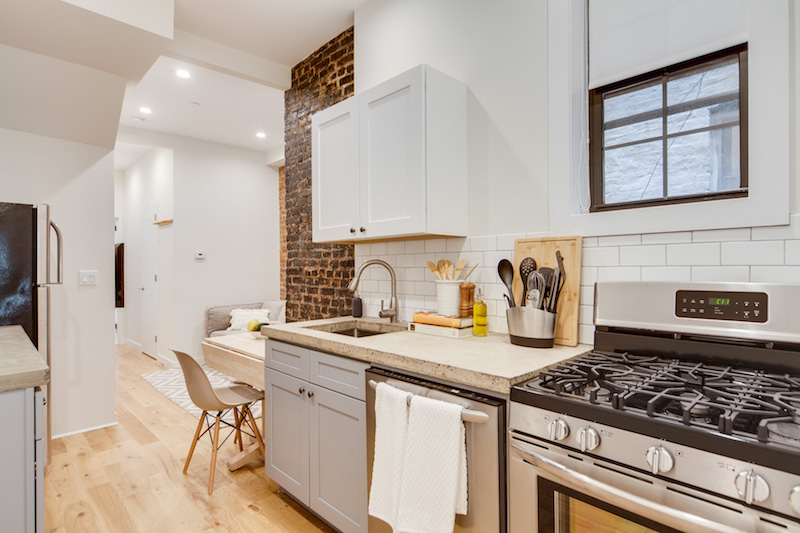As shared living grows in popularity, Common, a co-living company that provides community-minded shared living options, has added two new coliving homes to its portfolio. Common Lincoln, the company’s seventh Brooklyn offering, and Common Cornelia, the first Common co-living home in Queens, are the newest of Common’s 14 homes that span New York, San Francisco, Washington D.C., and Chicago.
Common Lincoln is located in Prospect-Lefferts Gardens, Brooklyn. The space provides 17 coliving bedrooms in two adjoining buildings with shared community space. As a special perk for this location, residents receive discounts to the restaurant located on the ground floor. Pricing starts at $1,400 per month for a 12-month lease.
 Common Lincoln. Courtesy of Common.
Common Lincoln. Courtesy of Common.
 Common Lincoln. Courtesy of Common.
Common Lincoln. Courtesy of Common.
 Common Lincoln. Courtesy of Common.
Common Lincoln. Courtesy of Common.
 Common Lincoln. Courtesy of Common.
Common Lincoln. Courtesy of Common.
Common Cornelia is located in Ridgewood, Queens in a three-story brownstone with 18 coliving bedrooms. Each suite features three bedrooms and a shared bathroom, kitchen, and living room. Community spaces, a backyard, and a rooftop are also included. Pricing starts at $1,700 per month for a 12-month lease.
 Common Cornelia. Courtesy of Common.
Common Cornelia. Courtesy of Common.
 Common Cornelia. Courtesy of Common.
Common Cornelia. Courtesy of Common.
 Common Cornelia. Courtesy of Common.
Common Cornelia. Courtesy of Common.
 Common Cornelia. Courtesy of Common.
Common Cornelia. Courtesy of Common.
All memberships at Common, which must be applied for online, include community-led events, weekly cleanings, shared supplies, enterprise-quality Wi-Fi, heating and air, and on-site laundry.
With the two new coliving homes, Common now has 333 bedrooms across its four cities of operation.
Related Stories
Urban Planning | Jun 15, 2023
Arizona limits housing projects in Phoenix area over groundwater supply concerns
Arizona will no longer grant certifications for new residential developments in Phoenix, it’s largest city, due to concerns over groundwater supply. The announcement indicates that the Phoenix area, currently the nation’s fastest-growing region in terms of population growth, will not be able to sustain its rapid growth because of limited freshwater resources.
Multifamily Housing | Jun 15, 2023
Alliance of Pittsburgh building owners slashes carbon emissions by 45%
The Pittsburgh 2030 District, an alliance of property owners in the Pittsburgh area, says that it has reduced carbon emissions by 44.8% below baseline. Begun in 2012 under the guidance of the Green Building Alliance (GBA), the Pittsburgh 2030 District encompasses more than 86 million sf of space within 556 buildings.
Industry Research | Jun 15, 2023
Exurbs and emerging suburbs having fastest population growth, says Cushman & Wakefield
Recently released county and metro-level population growth data by the U.S. Census Bureau shows that the fastest growing areas are found in exurbs and emerging suburbs.
Engineers | Jun 14, 2023
The high cost of low maintenance
Walter P Moore’s Javier Balma, PhD, PE, SE, and Webb Wright, PE, identify the primary causes of engineering failures, define proactive versus reactive maintenance, recognize the reasons for deferred maintenance, and identify the financial and safety risks related to deferred maintenance.
Mixed-Use | Jun 12, 2023
Goettsch Partners completes its largest China project to date: a mixed-used, five-tower complex
Chicago-based global architecture firm Goettsch Partners (GP) recently announced the completion of its largest project in China to date: the China Resources Qianhai Center, a mixed-use complex in the Qianhai district of Shenzhen. Developed by CR Land, the project includes five towers totaling almost 472,000 square meters (4.6 million sf).
Mixed-Use | Jun 6, 2023
Public-private partnerships crucial to central business district revitalization
Central Business Districts are under pressure to keep themselves relevant as they face competition from new, vibrant mixed-use neighborhoods emerging across the world’s largest cities.
Multifamily Housing | Jun 6, 2023
Minnesota expected to adopt building code that would cut energy use by 80%
Minnesota Gov. Tim Walz is expected to soon sign a bill that would change the state’s commercial building code so that new structures would use 80% less energy when compared to a 2004 baseline standard. The legislation aims for full implementation of the new code by 2036.
Student Housing | Jun 5, 2023
The power of student engagement: How on-campus student housing can increase enrollment
Studies have confirmed that students are more likely to graduate when they live on campus, particularly when the on-campus experience encourages student learning and engagement, writes Design Collaborative's Nathan Woods, AIA.
Multifamily Housing | Jun 1, 2023
Income-based electric bills spark debate on whether they would harm or hurt EV and heat pump adoption
Starting in 2024, the electric bills of most Californians could be based not only on how much power they use, but also on how much money they make. Those who have higher incomes would pay more; those with lower incomes would see their electric bills decline - a concept known as income-based electric bills.
Multifamily Housing | May 30, 2023
Boston’s new stretch code requires new multifamily structures to meet Passive House building requirements
Phius certifications are expected to become more common as states and cities boost green building standards. The City of Boston recently adopted Massachusetts’s so-called opt-in building code, a set of sustainability standards that goes beyond the standard state code.

















